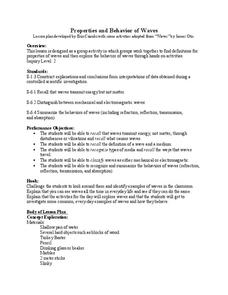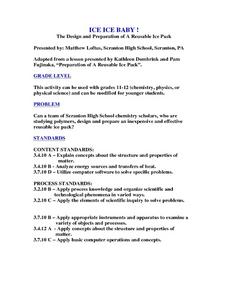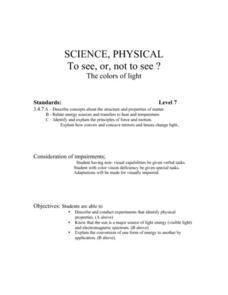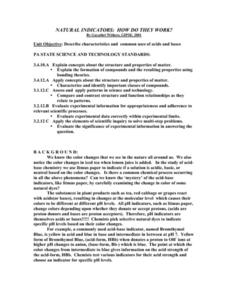Curated OER
Properties and Behavior of Waves
High schoolers explore the different properties of waves. In this physics lesson, students differentiate mechanical and electromagnetic waves. They explore each lab station and write their observation about the wave behavior they see.
Purdue University
Yucky Water? No Problem!
Young scholars study the process of water filtration in a three-part STEM lesson. After analyzing samples of dirty water, teams design and build their own filtration systems and measure their efficiency.
Teach Engineering
Measuring Viscosity
Groups use a marble to determine the viscosity of household fluids. The procedure calls for pupils to measure the amount of time it takes a marble to fall a specified distance in the fluids. Using unit conversions and algebra, the teams...
Curated OER
Introduction And Brief History of Materials Science
Students develop an understanding of the concept of matter. They l participate actively in the bubble raft experiment as described on the Center for Thermal Spray Research's website. They demonstrate dislocations and grain...
Curated OER
Heat of an Unknown Metal
Eighth graders complete labs to find the specific heat of many different types of substances, and use characteristic property to identify an unknown metal. CBL be used to determine energy lost or gained, and students complete a...
Curated OER
Chemistry Module
Students build metal atomic models using styrofoam. In this chemistry lesson, students identify the different unique properties of metals. They explain how metal atoms bond.
Curated OER
Matter
Eighth graders explore chemical reactions and their products. They define a chemical reaction and describe the characteristics of a chemical reaction. Students classify chemical reactions.
Curated OER
The Penny Factory
Fourth graders identify the characteristics of a simple physical and chemical change. They describe objects by the properties of the materials from which they are made and separate or sort items using these properties. Students explain...
Curated OER
Flipping Coins: Density as a Characteristic Property
Young scholars explore linear functions in a crime solving context. They collect and analyze data using linear equations, then interpret the slope and intercepts from a linear model.
Curated OER
Poster Assignment: Sports Chemistry
Tenth graders distinguish between chemical and physical properties and changes in matter when given specific examples. They view a video of sports activities. Students chose their favorite sport and design an experiment to improve sports...
Curated OER
Ice Ice Baby! The Design and Preparation of A Reusable Ice Pack
Young scholars explore polymers by designing and preparing an inexpensive and effective reusable ice pack. They develop and test a design for a reusable ice pack in the science lab. Students apply chemical and physical properties of...
Steinhardt Apps
Kinetic Molecular Theory
Building off young chemists' knowledge of the states of matter, kinetic molecular theory is the focus of the unit. Eight days of lessons including multiple demonstrations, one lab experiment, directed instruction, and worksheets,...
Curated OER
To See or Not to See: The Colors of Light
Seventh graders describe and conduct an experiment that identifies the physical properties of light. They explore sources of visible light and an electromagnetic spectrum. Students explain the conversion of one form of energy to another.
National Nanotechnology Infrastructure Network
Nanotechnology Invention and Design: Phase Changes, Energy, and Crystals
What does it take to be considered a smart material? Learners investigate the properties of Nitinol, a smart material, through a hands-on lab activity. They examine the crystal lattice structure and the conditions required for Nitinol to...
Curated OER
Birds of a Feather
Students investigate birds and complete a variety of bird-themed activities. They read books and observe birds noting their physical characteristics, development and life cycle stages.
Curated OER
Separating Solids Experiment
In this separating solids experiment worksheet, students follow the procedures to find what physical properties could be used to separate a mixture of pepper, salt, sand and iron filings.
Curated OER
What's The Matter: A Sinker or Floater?
Students conduct an experiment. For this water lesson, students watch the lesson "Float and Sink" on an interactive website. Students learn how to test items in water and then work in groups to test their items. Students discuss their...
Curated OER
Properties of Magnetic Forces
Students explore what a magnetic force is and what kinds of objects are attracted to a magnet. They use a magnet to sort objects taht are and are not attracted to a magnet. Students then explain why the objects were or were not...
Curated OER
What Can We Do To Change These Materials
First graders perform experiments to investigate property changes that occur in materials or matter. In the science lab, they use heat to explore changes in rice, sand, gelatin, baking soda and more. Learners observe and record the...
Curated OER
Introduce Solids
Pupils identify and interpret a variety of solid materials - cloth, wood, metal, plastic, paper, and rubber. After a period of free exploration, they then describe the properties of the objects and develop vocabulary in order to...
Curated OER
Permafrost: Permanently Frozen Ground
Students explore permafrost. In this 3 states of matter activity, students identify characteristics of solids and liquids. Students observe water and soil melting and freezing at various temperatures. Students make...
Curated OER
Natural Indicators: How Do They Work?
Students describe characteristics and common uses of acids and bases. They describe the role of natural indicators in the chemistry of acids and bases after testing and making observations on a variety of plant extracts. Students observe...
Curated OER
Density
In this density worksheet, students read a selection on density and answer 10 questions using the information from the selection.
Curated OER
Exploring Limu Diversity
Students explore limu diversity. In this ocean ecosystem lesson plan, students classify limu according to its physical properties. Students work in small groups to generate scientific observations and sort limu by characteristics.























